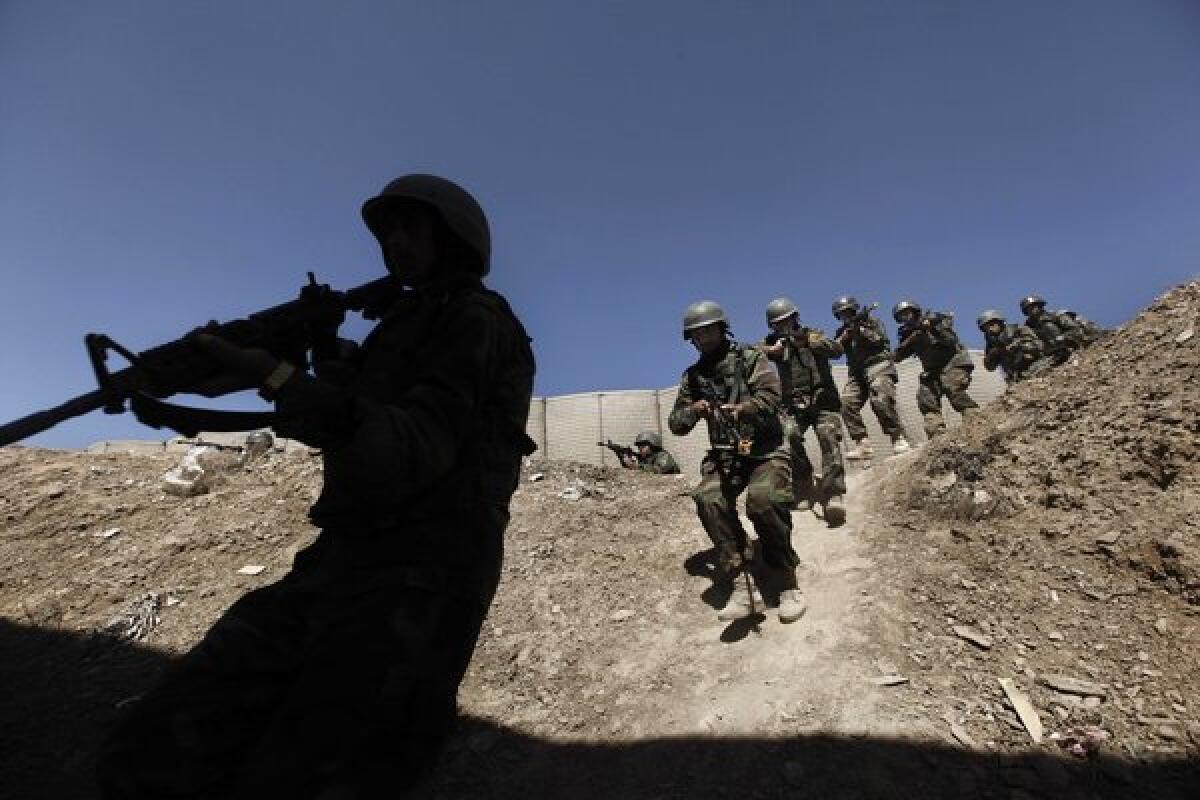How the West can fight terrorism without provoking more of it

Lessons supposedly learned from counter-terrorism operations after 9/11:
-- Massive U.S. deployments to faraway lands like Iraq and Afghanistan are expensive, protracted and perceived as American invasions.
-- Drone strikes ignite resentment, for “collateral damage” sometimes inflicted on innocents and for their disregard of another nation’s sovereignty.
-- Terrorist groups are migratory and adaptable, able to regroup after being flushed out of one unstable country to set up camp in another.
-- America doesn’t always have to be at the forefront, as witnessed by the French-led deposing of Islamic extremists from northern Mali earlier this year.
As the United States and its allies count down to withdrawal of their forces from Afghanistan next year and ponder how to fight newly resurgent extremism elsewhere in the world, international security strategists advocate a more modest military footprint in foreign conflicts.
Last month’s deadly assault on a Nairobi, Kenya, shopping mall by a mere handful of Somali fighters of the Shabab terrorist group was a prime example of the more dispersed threat now faced by the United States and its allies.
Instead of the Al Qaeda-led global militancy of a decade ago, the threats today more often emanate from regional conflicts like the Shabab, Boko Haram extremists fighting secular education in Nigeria and the Moro Islamic Liberation Front in the Philippines seizing hostages to press for Muslim autonomy.
While the terrorism threats are multiple, increasing and widely scattered, they may be easier to confront than was Al Qaeda in its 9/11 iteration. Local police and troops adequately trained and equipped by U.S. special operations troops could defeat insurgents in their countries with fewer consequences for Washington and its allies, analysts say.
The Shabab militia has suffered significant erosion of its clout in Somalia, where last year it lost control of the port of Kismayo and its main source of income, said Angel Rabasa, a senior political scientist at Rand Corp. and co-author of “Deradicalizing Islamist Extremists.”
One of the best ways to defuse localized threats is by obtaining intelligence from the interrogation of captured militants, and the Shabab’s current disarray following a June internal purge makes its fighters more vulnerable to defections, Rabasa said.
“Ninety percent of information we obtain about a group comes from people captured who then cooperated with interrogators,” Rabasa said, criticizing the use of lethal drone strikes as missed opportunities to nab sources of inside intelligence.
Rather than going after foreign terrorists with overwhelming force, the U.S. military needs to deploy small, strategic contingents of special operations forces to train a foreign ally’s police and soldiers to do their own fighting, said Linda Robinson, a former advisor to the U.S. military center on Afghanistan and Pakistan operations and author of “One Hundred Victories: Special Ops and the Future of American Warfare.”
“The more we make it a one-on-one fight [with the United States], the more likely they are to come back at us,” she said of foreign-based terrorist groups. She pointed to U.S.-orchestrated operations against the Yemeni group Al Qaeda in the Arabian Peninsula, thought to have spurred several attempted attacks on U.S. targets, including the failed 2010 plot to bomb New York’s Times Square.
Seth Jones, a former planning officer with U.S. Special Operations Forces in Afghanistan now teaching at Johns Hopkins University’s School for Advanced International Studies, agrees that Washington needs to be wary of intervening in regional disputes that make the United States a target for retaliation.
Northern and Eastern Africa are awash with militant groups taking advantage of internal uprisings, weak governments and sectarian divisions, he said.
“These operations are more decentralized than we’ve ever seen. The command and control mode in Pakistan has been severely weakened and there is a lot more autonomy in the local groups,” Jones said. “I think the United States has got to be careful, as these groups are not targeting the U.S. homeland.”
To keep foreign counter-terrorism at arm’s length, the United States needs to build up security forces in friendly countries through “soft partnering,” Jones said. He referred to the benefit of training, arming and even accompanying foreign police or troops to a target but leaving it to the locals to “pull the trigger.”
Ed Husain, senior fellow for Middle East studies at the Council on Foreign Relations, says moderate Muslim organizations committed to countering the hostile message of Islamic extremists are proliferating in the United States and Europe. They are using social media to challenge conspiracy theories and the militants’ narrative that Muslims are victims of the West, he said.
He proposes a coordinated worldwide effort to build on the State Department’s Global Counterterrorism Forum aiming to change hearts and minds to defeat radical Islam.
“Done properly,” Husain insisted in an essay last month, “within eight to 10 years Al Qaeda’s theology and ideology can become as unattractive among young Muslims as communism became to East Germans.”
ALSO:Passenger lands plane in Britain after pilot collapses
Pakistan’s Pervez Musharraf granted bail; house arrest may end
Italy arrests Tunisian in migrant ship tragedy, plans state funeral
A foreign correspondent for 25 years, Carol J. Williams traveled to and reported from more than 80 countries in Europe, Asia, the Middle East and Latin America.
More to Read
Sign up for Essential California
The most important California stories and recommendations in your inbox every morning.
You may occasionally receive promotional content from the Los Angeles Times.











